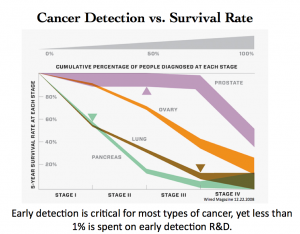Chemistry department targets cancer with infrared light

UCF chemists, led by Professor Kevin Belfield, have developed probes that may help doctors diagnose and treat tumors. Photo by Jason Greene / Univerity of Central Florida.
Dr. Kevin Belfield, the chair of the chemistry department, and researchers in his laboratory have made major advances in nanomedicine by developing molecular probes that can be used for early cancer detection.
“Our ultimate goal is to stop the blood vessels that are feeding the tumor therefore killing the tumor,” Belfield said.
Their work has lead to five papers in prestigious international science journals in 2010 alone. The paper “Linear and Nonlinear Photophysics and Bioimaging of an Integrin-targeting Water-soluble Fluorenyl Probe” was published in the Organic and Biomolecular Chemistry and “Folate Receptor Targeting Silica Nanoparticle Probe for Two-photon Fluorescence Bioimaging” was published in Biomedical Optics Express.
“The first two papers explain how we developed probes that target integrin, which is a protein that is important in new tumor growth,” Belfield said.
The Journal of Organic Chemistry published “A Series of Fluorene-based Two-photon Absorbing Molecules: Synthesis, Linear and Nonlinear Characterization, and Bioimaging” and wrote a feature piece on the team’s work on lysosomal imaging.
The scientists developed tiny probes that attach to lysosomes and exhibit fluorescence when hit by near infrared laser light. The probes can search for specific proteins found in tumors. Someday they cold help doctors diagnose and treat those tumors.
Finally, the Journal of the American Chemical Society published a feature article entitled “High Fidelity Hydrophilic Probe for Two-photon Fluorescence Lysosomal Imaging.”
“We concentrate on the photo stability aspect so the same sample can be imaged again and again,” Belfield said.

